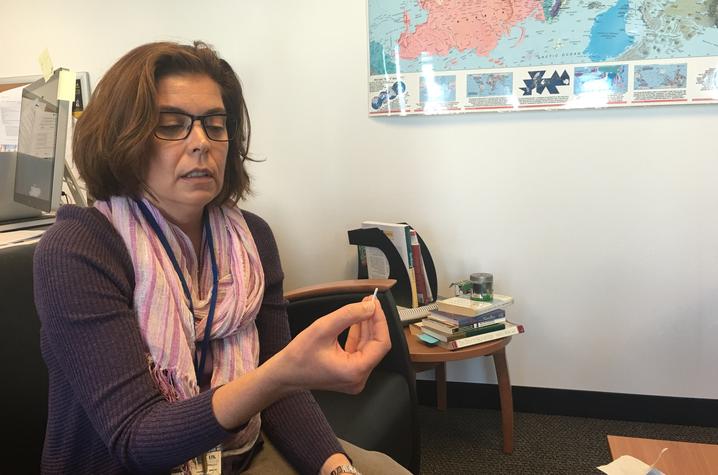Promising Results in UK Clinical Trial Moves Opioid Therapy Closer to Market
A multi-site clinical trial led by researchers at the University of Kentucky Center on Drug and Alcohol Research (CDAR) has demonstrated the effectiveness of CAM2038, a potentially transformative buprenorphine therapy for moderate-to-severe opioid use disorders.
The randomized, double-blind clinical trial compared the performance of weekly and monthly CAM2038, a fluid crystal depot buprenorphine therapy developed by Braeburn Pharmaceuticals and Camurus, with the current standard of care, a daily sublingual dose of buprenorphine/naloxone. In this Phase III trial, non-inferiority was demonstrated on the primary responder rate outcome, which was based upon highly sensitive urine testing detecting illicit opioids.
The 36-site trial, led by Dr. Michelle Lofwall in UK’s CDAR, established the drug’s non-inferiority to the current daily sublingual treatment, a critical milestone in the application for FDA approval. While results indicated CAM2038 met non-inferiority, a key secondary outcome demonstrated that CAM2038 was superior to current standard treatment based on a pre-defined cumulative distribution function of illicit opioid use.
Opioid overdose causes more than 30,000 deaths every year, and 2.6 million Americans suffer from an opioid use disorder. More than 12.5 million people misused a prescription opioid pain reliever and 800,000 used heroin in 2015. The National Institutes on Drug Abuse has called for safe, proven solutions to initiate treatment and stabilize patients through an extended opioid maintenance and recovery program. The Surgeon General’s Report has called for more access to evidence-based effective treatments, such as buprenorphine, for opioid use disorders.
The study’s positive results provide a firm foundation of supportive evidence necessary for entering the FDA-approval submission process. Evidence from the trial suggests people with a moderate-to-severe opioid use disorder might benefit from receiving an injectable therapy administered on a weekly or monthly basis. The weekly injection is appropriate for induction and initial stabilization, and the monthly injection is conducive for stabilized patients. Together, both week and monthly medications allow for flexible and individualized dosing that is critical for optimal patient outcomes and recovery from a deadly disease.
Lofwall, a psychiatrist and associate professor in the UK College of Medicine, served as principal investigator on the study along with Sharon Walsh, director of the CDAR. Lofwall, who sees patients’ personal struggles with opioid use disorder in clinical practice, stresses the need for progressive and practical therapies to treat opioid addiction. An injectable therapy administered in a clinician’s office eliminates the risk of diverting traditional forms of buprenorphine and decreases the risk of relapse and overdose related to non-adherence. The discreet nature of the therapy also eliminates some stigma and shame felt by patients taking oral opioid maintenance medications in daily life.CDAR. Lofwall, who sees patients’ personal struggles with opioid use disorder in clinical practice, stresses the need for progressive and practical therapies to treat opioid addiction. An injectable therapy administered in a clinician’s office eliminates the risk of diverting traditional forms of buprenorphine and decreases the risk of relapse and overdose related to non-adherence. The discreet nature of the therapy also eliminates some stigma and shame felt by patients taking oral opioid maintenance medications in daily life.
“If approved, the CAM2038 weekly and monthly injectable buprenorphine medications can improve how we treat opioid addiction and decrease the stigma associated with the medication that is in large part due to concerns about non-adherence and diversion,” Lofwall said. “Together with the six-month buprenorphine implant, these new long-acting medication delivery systems would allow us to administer a proven medication to the patients directly, ensuring adherence, leading to improved medication efficacy as demonstrated in this trial as well as avoiding the potential for missed or stolen doses, diversion or accidental pediatric exposure, which are significant public health concerns.”
Braeburn Pharmaceuticals, an Apple Tree Partners company, is a commercial-stage pharmaceutical company delivering individualized medicine in neuroscience. Long-acting therapeutic treatment options can be essential to improving patient outcomes and facilitating recovery in neurological and psychiatric disorders, which are often complicated by stigma and present significant public health challenges.
MEDIA CONTACT: Elizabeth Adams, elizabethadams@uky.edu
